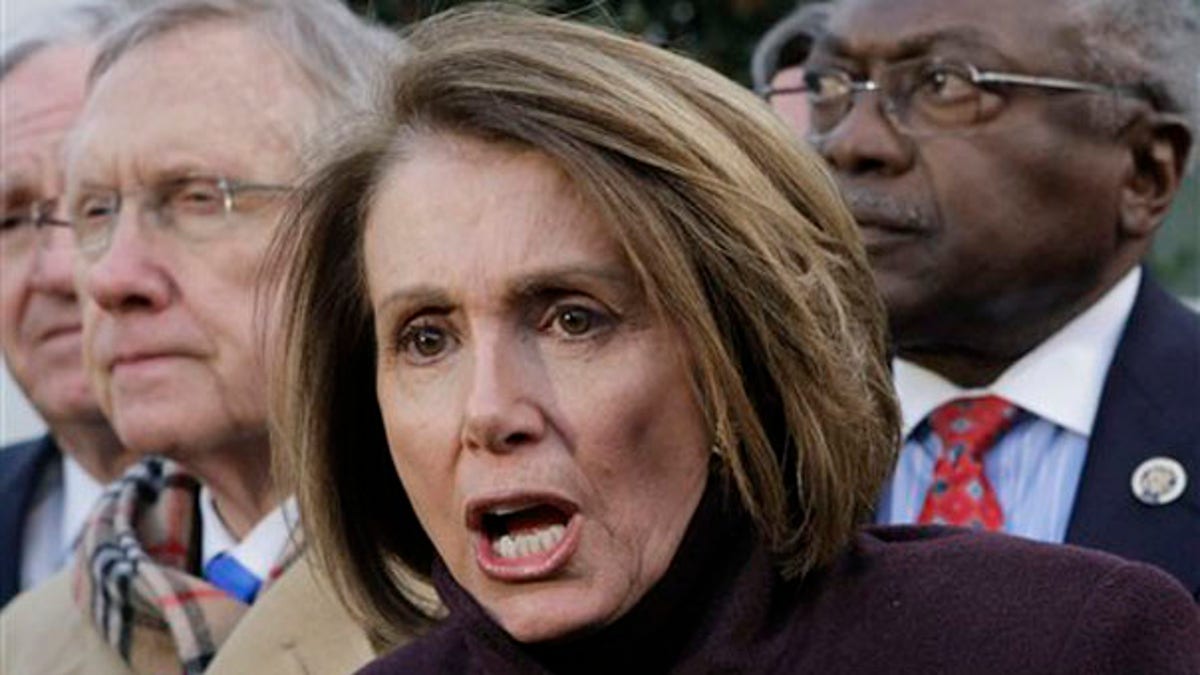
House Speaker Nancy Pelosi, accompanied by Senate Majority Leader Harry Reid, and House Majority Whip James Clyburn, speaks with reporters outside the White House in Washington, Thursday, Feb. 25, 2010, at the end of a day of meetings with President Obama at Blair House on health care reform. (AP)
If President Obama’s not-so-veiled threat this week to push for passage of health care reform without Republican support meant that he was close to giving up on a bipartisan bill, it also meant that Democratic lawmakers may have to walk the plank to approve the president’s signature initiative.
That’s because the last thing Democrats need in a tough election year is an unpopular and partisan health care bill that Republican opponents can use as ammunition in November.
And moderate Democrats who are considered vulnerable candidates may feel uneasy focusing more on health care than jobs -- an issue Obama has pivoted from since his State of the Union address last month.
Obama concluded a seven-and-half hour White House summit Thursday by telling Republicans that if they can’t put aside their differences on the health care legislation within six weeks, then he and Democratic leaders would have to “go ahead and make some decisions.”
“And then, that’s what elections are for,” he said. “We have honest disagreements about the vision for the country, and we’ll go ahead and test those out over the next several months till November.”
The White House called the summit productive and said GOP ideas are now under consideration. Obama is expected to tell the country Wednesday what comes next.
But without Republican support, the only way Democrats can close the deal on health care is through a controversial budget measure known as reconciliation, or what Republicans are calling the “nuclear option.”
Under reconciliation, only 51 votes in the Senate, a simple majority, are required to pass legislation. The House could approve the Senate bill that passed Christmas Eve, and the Senate could use reconciliation to make the changes that House Democrats want.
But that might further alienate the public, which, polls show, is mostly against the health care bill.
“The last three elections in Virginia, New Jersey and Massachusetts were at least in part a referendum on the Obama agenda, including health care,” said Larry Sabato, director of the University of Virginia Center for Politics.
“And the referendum was obvious,” he said. “It was no on the Obama proposal on health care. Then you have literally dozens of national surveys that have shown the public moving strongly against Obama health care.”
With polls predicting major Democratic losses in November, some lawmakers may be reluctant to risk their job to vote for an unpopular measure.
The House barely passed its own version of health care last year with a vote of 220-215.
“There’s some tremendous obstacles in the House,” Sabato said. “First of all, several members who voted in that very narrow vote for that health care reform package have left the House. ... There are others who voted for it the first time who are already indicating that they’re leaning against voting for it again.”
But Democratic leaders expressed confidence that they will be able to get health care over the goal line.
“What you called a complicated process is called a civil majority, and that’s what we’re asking the Senate to act upon,” House Speaker Nancy Pelosi said Friday.
Fox News' Major Garrett and Jim Angle contributed to this report.




